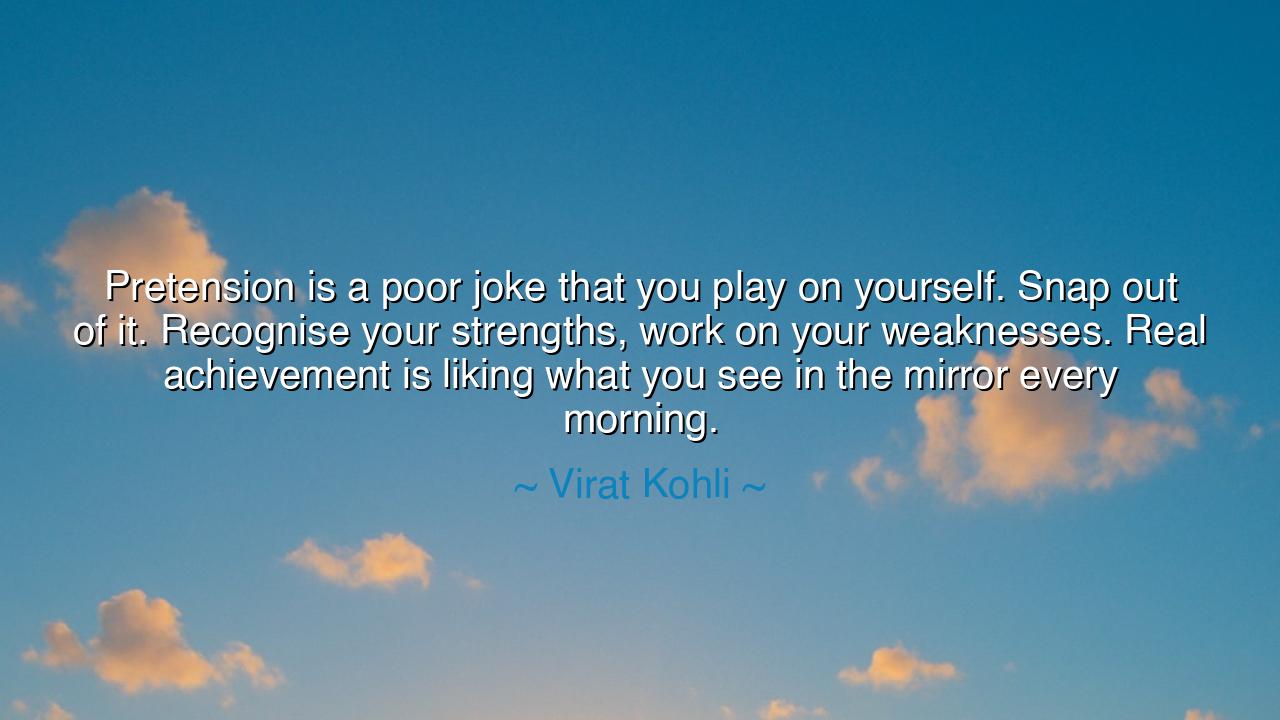
Pretension is a poor joke that you play on yourself. Snap out of
Pretension is a poor joke that you play on yourself. Snap out of it. Recognise your strengths, work on your weaknesses. Real achievement is liking what you see in the mirror every morning.






Hear the words of Virat Kohli, spoken with the sharpness of a sword and the clarity of a river: “Pretension is a poor joke that you play on yourself. Snap out of it. Recognise your strengths, work on your weaknesses. Real achievement is liking what you see in the mirror every morning.” In these lines is the wisdom of warriors and philosophers alike—the call to cast away illusions, to embrace truth, and to find honor not in masks, but in self-mastery.
When he says that pretension is a joke, Kohli speaks to the folly of living behind disguises. To pretend is to deny one’s own truth, to put on costumes for the world while deceiving the self. Such a life may win applause for a time, but it leaves the soul empty, laughing at itself in bitterness. Like a hollow statue painted in gold, it crumbles when touched. The ancients warned against this, for in every age men have tried to appear what they are not, and in every age, truth has shattered their illusions.
But Kohli does not only warn—he commands: “Snap out of it.” These words are a call to awakening. They demand courage, for to drop pretense is to face the naked self. One must look with clear eyes at both light and shadow, at both strengths and weaknesses. To recognize one’s strengths is not arrogance but gratitude, for gifts are to be acknowledged and used well. To recognize one’s weaknesses is not shame but wisdom, for only by naming them can they be transformed.
History gives us shining examples. Consider Marcus Aurelius, emperor of Rome, who each day wrote in his meditations reminders not to be carried away by pride or false images. He was the ruler of the greatest empire, yet he warned himself daily: do not play a part, do not chase illusion, remain grounded in truth. His strength lay in his honesty with himself, his willingness to see both his greatness and his flaws. Like Kohli’s teaching, his wisdom shows us that the truest victory is over the self.
Kohli’s final words strike like a hammer: “Real achievement is liking what you see in the mirror every morning.” This is not about vanity, but about peace. To look upon your reflection and feel no disgust, no shame, no gnawing falsehood—that is the deepest form of triumph. For wealth may fade, applause may die, and records may be broken, but the quiet approval of the self endures. It is the one crown that cannot be taken away, for it is forged in truth.
The deeper meaning here is that self-acceptance does not come from perfection, but from effort. To live honestly, to labor on one’s flaws, to grow steadily in both body and spirit—this is what makes the reflection in the mirror a source of pride rather than regret. The mirror reveals not only the face, but the life behind the face: the discipline, the honesty, the courage. To like that reflection is to know you have lived without deceit.
The lesson is clear: cast aside the mask of pretension, for it robs you of both joy and growth. Face yourself honestly, rejoice in your strengths, labor on your weaknesses, and each day build a life that makes you worthy of your own respect. The practical action is this: stand before your mirror each morning and ask, Do I admire the person I see? If not, do not despair—work upon yourself, one step at a time, until the answer becomes yes.
For in the end, true achievement is not medals or riches, but integrity of self. And the greatest victory is not over an opponent, but over the falsehood within. Let Kohli’s words be remembered as a call to all generations: live in truth, and the mirror itself will one day smile back at you.






AAdministratorAdministrator
Welcome, honored guests. Please leave a comment, we will respond soon